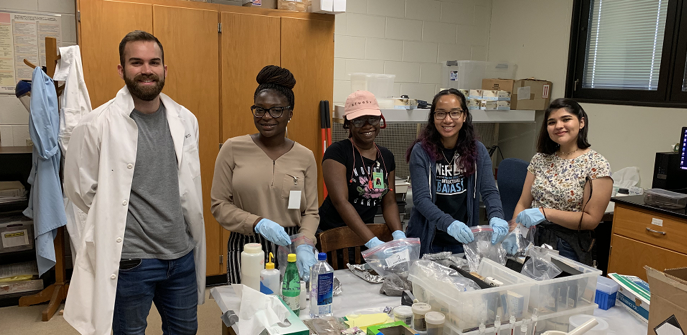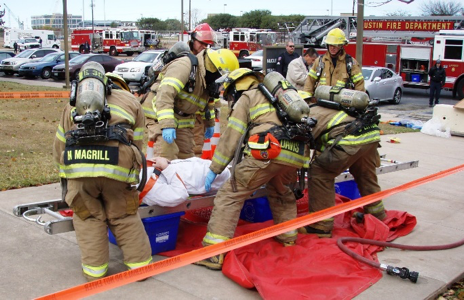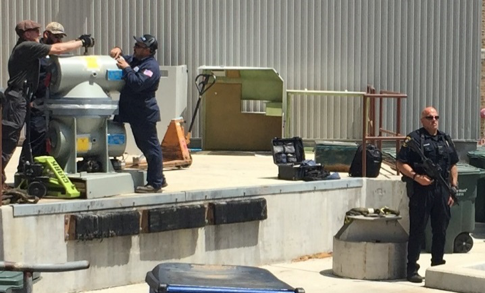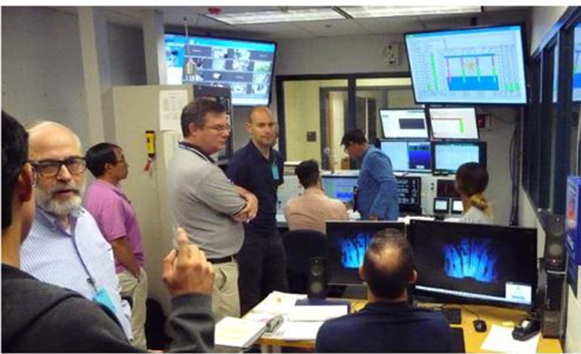Distance Learning
The distance learning program in graduate teaching and research has existed since 1999 in the Nuclear and Radiation Engineering (NRE) Program within the Walker Mechanical Engineering Department. It has served many graduate students in the national laboratories, industry and the Department of Defense who have sought advanced degrees while maintaining full time employment. The demographics of these students cover a wide range of ages from BSc recent graduates completing their MS/PHD degrees to those well along in their careers.
The NRE distance learning program has matured into a well-disciplined entity with consistent, frequent student advising by faculty and comprehensive coverage of all NRE courses. We now offer experimental courses in Nuclear and Radiochemistry, and Gamma-Ray Spectrometry where the students take all the laboratory requirements in one weekend late in the semester while following the lectures on-line. Distance learning students who have graduated or are currently in the program are from Southwest Research Institute (San Antonio) , South Texas Project Nuclear Generating Station (Texas), Knolls Atomic Power Laboratory (KAPL), Bettis Atomic Power Laboratory, Sandia National Lab (Albuquerque and Livermore) , Pacific Northwest National Laboratory (PNNL), Brookhaven National Laboratory (BNL), Los Alamos National Laboratory (LANL), Oak Ridge National Laboratory (ORNL), DoD (Army and Air Force), PANTEX, Department of Homeland Security, Sterigenics, MD Anderson Cancer Center, and Texas Department of Health Services Radiation Control Program.
Students apply directly to the program via the usual application process (http://www.me.utexas.edu/graduate-admissions/graduate-program/graduate-admissions-faq). Applications to the NRE program can be submitted throughout the year for a fall, spring or summer semester commencement. A minimum undergraduate GPA of 3.0 (although the typical incoming graduate student has higher GPA scores of 3.5 or better) is required along with very good Graduate Record Exams (GRE) scores. Typically, the applicant is considered on the basis of a combination of GPA, GRE, work experience, letters of reference, and a written statement of personal interest in the NRE Program. Students who have GPAs less than 3.0 or poor GRE scores are discouraged from applying. Since all the students are self-supporting they can apply off cycle and start in any semester. Students may transfer up to two courses from another university for the MS degree, if they have not been counted for a degree, but no courses are transferable for the PhD degree.
A comprehensive description of courses can be found on the undergraduate courses page and on the graduate courses page. An undergraduate senior level course in Nuclear Power Systems is also offered for students with minimal nuclear engineering background and this course counts towards the MS degree. There is a two week intensive course given on campus called Radiation and Radiation Protection Laboratory (undergraduate) and Nuclear Health Physics Laboratory (graduate) which is not mandatory for the MS degree but strongly recommended for the PhD degree for those students who have never taken a course in nuclear instrumentation. Two courses in gamma-ray spectrometry and Nuclear and Radiochemistry are also offered with the off-campus students taking a series of laboratories over a weekend.
The Nuclear and Radiation Engineering program at The University of Texas at Austin has extensive experience delivering educational content to distance learning students. All the courses are digitally captured with Mediasite hardware and software. This software allows for simultaneous capture of the classroom computer display along with video and audio from the classroom. An example of such an output is seen on this web page. A Smartboard is utilized so instructors may write on the lecture slides and have the writing recorded in the digital video. To utilize the nuclear reactor for distance learning laboratories, in-house software has been developed providing a real-time remote display of the reactor conditions. Users may connect to this display via remote desktop, or a laboratory may be recorded with the Mediasite software. The software allows for recording of time-series data for numerous reactor parameters.
Off-campus students may also enroll in Option III Masters of Science in Engineering graduate degree - https://onlineme.engr.utexas.edu/programs/masters-degree/. This program consists of ten traditional courses in Mechanical Engineering; however, nuclear courses are also available.
For more information on the Distance Learning Program please contact Dr. Derek Haas, Area Coordinator,
Training
Along with university courses, NETL provides a broad spectrum of education and training from public education via tours of the facility to specialized nuclear incident training for first responders.
The Nuclear Engineering Teaching Laboratory has a very broad education mission. Along with university courses taught by Nuclear and Radiation Engineering faculty such as reactor engineering, nuclear power systems, and radiochemistry, NETL provides numerous other training programs.
The NETL has an in-house training program for reactor operators. After completion of this training program, individuals may sit for the licensing exams administered by the US Nuclear Regulatory Commission to obtain a reactor or senior operator license.
The Nuclear Engineering Teaching Lab and the Nuclear Radiation Engineering Program have had a long tradition of hosting scientists and engineers through the International Atomic Energy Agency fellowship program and individual countries for experimental and computational training. Activities include, reactor training, nuclear analytical methods and nuclear fuel cycle. Visitors including have come from Albania, Algeria, Argentina, Bangladesh, Egypt, Estonia, France, Hungary, Jordan, Mexico, Morocco, Nigeria, Portugal, Russia, Singapore, Tunisia, Turkey and Vietnam.
Since 2006 the NETL has given internships to undergraduate students mainly from Florida Memorial University bur recently from the University of Texas at Rio Grande Valley and graduate students from Florida International University. These opportunities expose underrepresented students to laboratory facilities to pursue careers in nuclear science and engineering. Funding sources to support these educational efforts have come from Office of Naval Research, Department of Energy and Department of Homeland Security.

The NETL provides specialized radioactive material incident and nuclear security training to first responders. This training is typically a combination of classroom and hands-on exercises and can be tailored to the needs of the first responder organization.


The NETL provides nuclear experience, training, and education for personnel who work within the Nuclear Regulatory Commission (NRC) through the Research and Test Reactor (RTR) Operations Training Course. This course provides training through lectures and hands on operations allowing the participants to experience real world applicability with the reactor.

The flexibility of NETL allows training to be offered on a wide variety of topics fit to the needs of the client. Training can be focused on specific operational topics such as gamma spectroscopy or may be more general like an overview of global nuclear security.
For more information, please contact Dr. William Charlton, Director Nuclear Engineering Teaching Lab,

